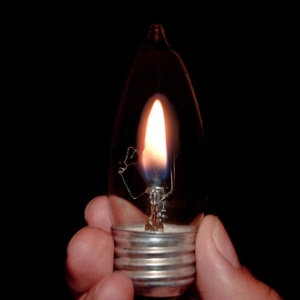
Earth Hour (20h30 – 21h30 local time everywhere, Saturday 28 March 2015), the annual 60 minutes of self-imposed non-electrified darkness to raise awareness of climate change, certainly has traction. Since its inception in 2007 it's grown to 9 million participants in over 7000 cities, making it, say organisers WWF, “the single largest symbolic mass participation event in the world”.
Yet while Earth Hour may have grown, it's always been dogged by criticism and sometimes outright ridicule. To many, nothing smacks of middle-class greenie slacktivism quite like the notion that an hour of candle-light is going to make the slightest bit of difference to the state of the planet.
Earth Hour vs. Edison Hour
It's annoyed some people enough to start a counter-movement. “Human Achievement Hour” and “Edison Hour” encourage supporters to rather spend the time partying on with lights ablaze to symbolise the brilliance of technological innovation as humanity's only true hope for the future.
Earth Hour, say these detractors, is just a dismal Luddite ritual that wants to trample on the fruits of science and usher in a new dark age.
So Earth Hour is a pretty hard sell to begin with, never mind trying to sell it to South Africans fed-up and foul-tempered from weeks of load-shedding. We feel regularly robbed of our power and we'll be damned if we'll give any more away willingly. To us, darkness currently equates with incompetence, stalled development and damage to the economy.
Being told we should voluntarily turn the lights off on a Saturday night holds about as much charm as being sent to our rooms without any supper.
Going over to the Dark Side
But despite all this, thousands in the country will be observing Earth Hour, and, grumpy and cynical though I may be feeling at the moment, I'll be among them. Here are some of the arguments I've used to remind myself why taking part on Saturday still matters; maybe they'll persuade you to come over to the Dark Side too:
Firstly, stop fretting about whether the Hour in itself makes a significant contribution to energy-saving; that has never been the point*. Earth Hour is meant primarily not as a pragmatic action but a symbolic gesture, aimed at keeping our collective attention focused on unsustainable resource use and anthropogenic climate change, the greatest threats humanity has ever faced.
(*Although Earth Hour does in fact have a short-term energy effect – A 2014 study published in Energy Research and Social Science found that on average electricity consumption drops by 4% during the Hour).
The environment: a human rights crisis
Why would we scoff at a gesture of such importance and dismiss it as pointless? I suspect that it is because, deep down, we harbour a fundamental lack of respect for the gravity of the environmental cause. Candle-light vigils and moments of silence for victims of atrocities and political conflict don't achieve anything especially practical either, but their symbolic importance doesn't get sniggered at.
A candle-lit vigil for the Earth, however, is viewed by many as hippy-dippy and superficial because, I think, we still haven't taken to heart the fact that the environmental crisis is as much about human rights and lives as a Darfur or a Syria. The World Health Organisation estimates that between 2030 and 2050, climate change will cause approximately 250 000 additional deaths per year, from malnutrition, insect-borne disease, diarrhoea and heat stress, mostly among the poorest and most vulnerable – a figure which well exceeds the toll of some of the world's bloodiest conflicts.
Switching on to real change
The real work of Earth Hour should happen during the remaining 8759 hours in the year. The big Switch Off is meant to act as an awareness switch on to practical change, and there are indications that it might in fact be doing so. Saliem Fakir, Head of WWF's Living Planet Unit, reckons, for instance, that the Seize Your Power campaign linked to Earth Hour 2014, which encouraged institutional investors such as pension funds to increase investment in renewable energy, helped effect a shift of over US$31 billion in energy investments.
Despite such encouraging examples, it does admittedly remain hard to prove how much Earth Hour really causes any of them happen. Rest assured though, if you do choose to reach for the off-switch this Earth Hour, that pretty much any action, symbolic or otherwise, has considerably better chance of achieving change than watching telly i.e. doing nothing at all instead.
Remember that politicians tend to pay attention to anything large numbers of potential voters seem to care about, and nine million off-switch votes is not to be sniffed at.
Finally, if you're still not convinced to join in on the upcoming Earth Hour, perhaps knowing this might do the trick (I'll confess it was the real clincher for me): Jeremy Clarkson, who has been known to drive into trees on purpose and refer to global warming as “science fiction”, apparently spends his Earth Hour switching on as many electrical appliances as he can lay his hands on.
Follow Earth Hour on Twitter or Facebook
Image: Candle from Shutterstock




 Publications
Publications
 Partners
Partners









